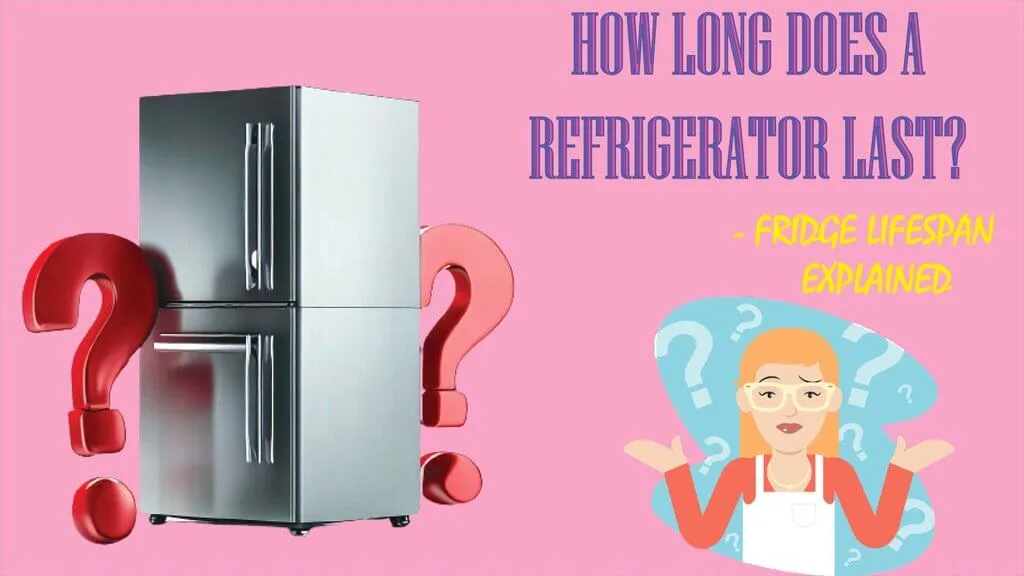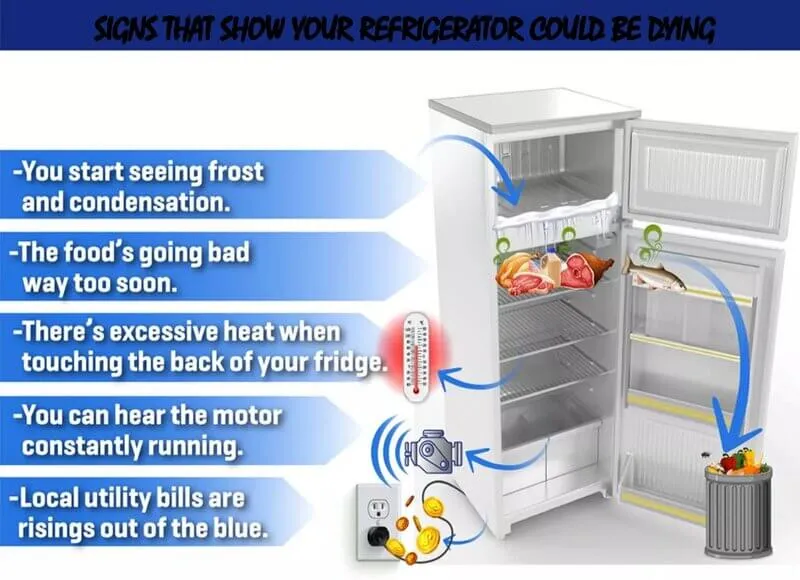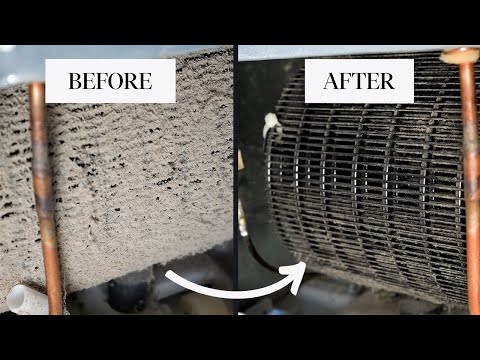Refrigerators are one of the crucial accessories of our home. Our lives today would be so unimaginable without the presence of refrigerators – since without them, we’d be having a hard time storing our foods. Now, imagine waking up one morning only to discover your refrigerator has stopped working and until you replace it with a new one (which is a lengthy process that could take days) you’ve nowhere else to preserve your perishables.
Therefore, it’s important to be aware beforehand about your refrigerator’s lifespan so that you don’t have to be in such a miserable situation in future. Well, curious to know how long does a refrigerator last? Not only are we going to break down the math for you but also guide you with some useful tips on increasing your refrigerator’s life expectancy.
Table Of Contents

Fridge Lifespan Explained; How Long Does a Refrigerator Last?
Well, the average lifespan of a refrigerator is considered to last between 10 to 15 years, which is also backed up by statistics from the Department Of Energy of the United States. However, that doesn’t mean you should kick out your refrigerator right away after it hits its 15th birthday even though it’s working properly and not on the fritz.
Honestly, we believe there’s no straightforward answer to the question ‘how long do refrigerators last’. It really depends on the brand, model, size, type of refrigerator and not just the age alone. If your refrigerator isn’t under regular maintenance and hardly cleaned up and taken care of, it may start malfunctioning and slowly wear out in less than 5-6 years of usage, eventually leaving you no choice but to repair or replace.
On the other hand, a refrigerator that is thoroughly cleaned and maintained is likely to survive and function for 20 years and even more. However, in case of mini fridges that aren’t so robust and use a lot of electricity, you can expect them to have an average lifespan of 8 to 13 years max.
The average life expectancy of your refrigerator also depends on the material quality and overall condition of the compressor. For instance, refrigerators with dual compressors and advanced ventilation features will last comparatively longer than ordinary fridges.
When Should You Replace a Refrigerator?
Every time your refrigerator is having a problem, you don’t think of replacing it right away. It’s better if you contact an experienced refrigerator expert or technician to come over and examine your refrigerator to guide you on the next steps.
Nevertheless, if the problems persist and continue despite all the maintenance and servicing, you should no longer waste all your money on frequent repairs because it’s clear – your refrigerator is dying. Therefore, it’s wise to invest all of the bucks towards a new kitchen appliance than on the old fridge.
Most people struggle to figure out when to repair the refrigerator and when it’s time to replace it. Here’s what you can do: contact a repairman and ask him to breakdown the total expense needed for fixing all the issues. If that’s more than 50% of the cost of a new regular-sized fridge, you may want to consider buying one of the newer models designed to be more energy-saving and efficient.
If you want to identify the perfect time for considering a replacement, you should first be aware of the warning signs that’ll indicate towards the slow death of your refrigerator to help you be prepared in advance with a Plan B. We’ve compiled a list of the important indicators below:
5 Signs That Your Fridge May Be Dying Slowly

1. EXCESS MOISTURE
Did you know, just like your body, your refrigerator can also sweat? As fascinating as it sounds, if there’s any moisture or condensation on the exterior of your refrigerator door, this may be an indication that something’s wrong with your fridge.
Most likely the door gasket has become faulty or there’s a tear in the door seal. Refrigerator door gaskets are there to act as a seal to retain all the cold air and prevent warm air sneaking in inside from the outer surrounding which condenses and later turns into frost. ‘Sweat’ on the refrigerator can also be caused if there’s mold forming in the space between your refrigerator doors.
What you can do in that case is buy a gasket repair kit to fix the problem yourself. Or you can also ask a skilled technician to help out.
2. FOOD SPOILING QUICKLY
The sole purpose of a refrigerator is to protect and preserve our foods and drinks and keep them cold enough to prevent bacterial growth which could cause severe illness otherwise. The moment your refrigerator stops living up to its main purpose – you’ll know it’s time to replace your fridge.
The only way you’ll find out is when the fruits and veggies, dairy products and foods as such start to go bad way earlier than the expiry date. This also indicates that your fridge is failing to maintain the optimal cold temperature required because of: either a faulty door seal, the refrigerator door being frequently opened for no reason or your habit of leaving the fridge door open for too long for all the warm air to go in and accumulate inside.
Also throw away spoiled food as soon as you find and don’t let it sit inside any longer to prevent bacteria growth from spreading to other compartments.
3. CHECKING NOISE LEVELS
Some people are concerned about repairing only when their fridge starts to make a lot of noise that they never heard it make before. Well, that’s just one side of the coin. If your fridge isn’t making any sounds at all, that’s also concerning because the motor may be wearing out and needs repairing.
A healthy and sound refrigerator should make a humming noise most of the time which is clearly a good indicator that the motor and compressor are running properly. You should consult an expert immediately if your refrigerator goes absolutely silent or makes too much noise.
4. OVERHEATING
It isn’t unusual for a refrigerator to emit heat since it’s running 24/7 and using a lot of power. You’ll often notice that the sides of your refrigerator feel hot to the touch.
Although it’s not one of the strongest symptoms of a dying refrigerator since it’s considered normal, a lot of overheating on the other hand can mean the coils at the back of your refrigerator need repairing.
Yes, coils can get too hot if your refrigerator is overworking because of you putting hot food into the fridge all the time right after you finished cooking without waiting for it to cool down. As a result, your refrigerator will use up even more electricity and generate more heat.
5. FROST BUILD UP
Do you have to manually defrost the ice build-up in your fridge by unplugging the whole outdated refrigerator every time? Does the freezer section always have an accumulation of ice no matter how much you get the freezer thermostat fixed by the repairman?
Well, this isn’t only a frustration but also an indicator that you should go for a replacement – perhaps a better frost free model with higher efficiency.
5 Smart Hacks To Increase Your Refrigerator Lifespan
With special refrigerator maintenance and proper care, and of course our exclusive guidelines, it’s not impossible to make your refrigerator last longer than 20 years. Here are some super useful fridge maintenance tips for you to prolong the life of your fridge:
The condenser coils and air vents at the back of your fridge can accumulate dirt and debris over the time if not vacuumed and cleaned at least twice a year. Before you begin the cleaning process, do not forget to unplug the fridge first and let it sit for at least 20-30 minutes. This way you can also melt off any excess frost buildup.
We highly recommend cleaning the interior shelves and compartments of a refrigerator once every two months with liquid soap and warm water. You can also use a lime solution with vinegar to get rid of any “dead animal” odors. Moreover, you should also change the water filter if it gets too dirty.
Most often, food crumbs or dust particles get caught up in the door gasket of your refrigerator. Therefore you should also wipe and scrub the door seal area if you want to prevent air leakage and help your refrigerator maintain an internal cold temperature without having to overload the compressor.
Where you have placed the refrigerator in your house can also play a role in affecting the longevity of your refrigerator’s shelf life. You should make sure it’s not directly exposed to the sun and not too close to appliances like a microwave or electric oven. Furthermore, there should be ample space all around the refrigerator to reduce its chances of overheating and for better air circulation. Also, do not place your refrigerator in the kitchen right beside the gas stove and you should always keep any neighboring heat vents shut closed.
Everyone of us at some point in our life definitely played with the refrigerator door to see at which point the lights go off. Well, although it’s a fun experiment to pass your leisure time, it’s certainly not ideal to open and close your refrigerator over and over again for no solid reason. Like we’ve said before, the more you open your refrigerator, the more warm air will find its way inside, disrupting the internal temperature.
No, you can’t just stack all the food containers one over another and scatter all the food inside. If you keep your foods organized and store them decently, not only will it look aesthetic but ensure more efficient air circulation inside. If you need some inspiration on how to organize foods in the fridge drawers and shelves properly, you can always take ideas from Pinterest or expert housewives!
Now for the final tip of the day, try to keep your food and drinks in sealed air-tight containers with lids on inside the fridge. That way any extra moisture will not be released into the air.
Overall Thoughts
We hope this article could guide you on how long a refrigerator can last and how you can make your refrigerator stay alive for longer than its expected shelf life. Make sure to follow our tips to ensure smooth operation of your refrigerator and you’ll be all good to go for the long run!
